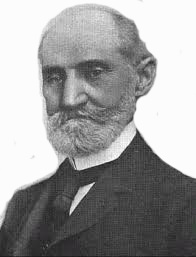 Henry C. Allen was born October 2, 1836 in the village of Nilestown, near London Ontario. He was a descendant of the Revolutionary War hero, Ethan Allen.
Henry C. Allen was born October 2, 1836 in the village of Nilestown, near London Ontario. He was a descendant of the Revolutionary War hero, Ethan Allen.
He studied medicine at the College of Physicians and Surgeons in Ontario, Canada and received his homeopathic training at Western Homeopathic College (AKA Cleveland Homeopathic College) in Cleveland, Ohio where he graduated in 1861. After his graduation, he entered the Union Army, serving as a surgeon under General Ulysses S. Grant.
After the Civil War Allen accepted the professorship of Anatomy at Cleveland and first started the practice of medicine. He later resigned this post to accept the same chair at the Hahnemann Medical College of Chicago. In 1875 he moved to Detroit and was appointed Professor of Materia Medica at the University of Michigan, Ann Arbor in 1880.
In 1892 Allen helped found the Hering Medical College and was Dean and Professor of Materia Medica until his death. During his tenure, he was respected and loved as few men are during their lives.
The 1890's saw the majority of Homeopathic colleges steeped in modern scientific homeopathy, emphasizing laboratory methods, surgery, and transient therapeutic and pathological fads. Hahnemann's teachings were often deemed dogmatic, antiquated, and visionary. Most graduates knew much of transient therapeutic and pathological fads, but little homeopathy.
Dr. Allen actively worked for reinstatement of the Organon in college curricula and was largely responsible for its wide-scale use during the turn of the century. Like Hahnemann and Hering before him, Allen passionately defended the inductive method described in the Organon.
His disagreement with Kent over the publication of unproven remedies in the Denver Critique illustrates this unwavering commitment to Hahnemann's principles. Kent had promised to publish one remedy a month, but since this proved to be impossible, he described remedies for which there were no provings or clinical experience. Instead he would combine the qualities of Alumina and Silica and speculate on the symptoms that would exist in Alumina silicata.
At the Homeopathic Congress of June 1908, Allen accused Kent of publishing unreliable materia medica. Kent retracted his position and never published a "synthetic" remedy again and actually removed them from the 2nd edition of his Lectures on Homeopathic Materia Medica. Allen was probably the only homeopath of his time who could stand up to Kent.
Allen was a member of several homeopathic societies including the AIH, IHA, and ones in England and India. In fact, Allen remained a member of the AIH to the end, where he upheld Hahnemannian principles, particularly in materia medica at their meetings and discussions. He was owner and editor of the Medical Advance for many years.
Besides writing many articles in this and other homeopathic journals he wrote numerous books. Some of Henry Allen's well-known works include:
He also revised Boenninghausen's Slip Repertory, which he updated and arranged for rapid and practical homeopathic work.
Dr. Allen was one of the guiding lights of Hahnemannian homeopathy. His efforts helped lay the groundwork for the creation of the International Hahnemannian Association. Even though he was steadfast in his adherence to the principles of Hahnemann, he always strived for constructive discussion.
Dr. Allen sustained his youthfulness and vitality in his later years. Even into his seventies he was as active and as physically vigorous as men half his age. Known for his quick wit he was welcomed at gatherings for his lively repartee and engaging anecdotes.
Dr. Allen passed away on January 22, 1909 after working all day and seeing patients in the evening. Until his last days he was constantly working for the benefit of homeopathy.
Books: 1879. The Homoeopathic Therapeutics of Intermittent Fever. Detroit, MI: Drake's Homeopathic Pharmacy. 232p. 1884. The Therapeutics of Intermittent Fever. Philadelphia, PA: F. E. Boericke. 342p. 1885. Secale Cornutum. Pittsburg, PA: Stevenson & Foster. 18p. 1902. The Therapeutics of Fevers. Philadelphia, PA: Boericke & Tafel. 541p 1910. The Materia Medica of the Nosodes. Philadelphia, PA: Boericke & Tafel. 583p. Keynotes of the MM With Nosodes. Materia Medica of Some Important Nosodes. Therapeutics Notes on Allen Key Notes Keynotes And Characteristics With Comparisons of some of the Leading Remedies of the Materia Medica Maharana Homoeo Reader
Maharana Homoeo Reader